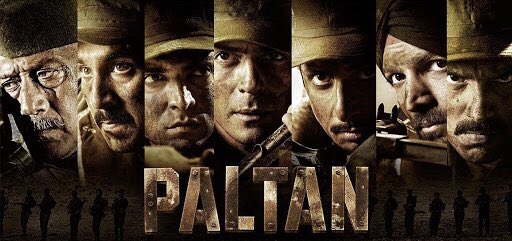Paltan Director - JP Dutta Cast - Arjun Rampal, Sonu Sood, Jackie Shroff, Gurmeet Choudhary, Harshvardhan Rane Rating - 1.5/5 I’m mildly surprised JP Dutta hasn’t yet used the National Anthem as background score. The cheerleading jingoism is so strong in his movies that a director like Dutta might be all too glad to have his audience forced to stand through the entire running-time of his long films, to parallel the way our brave soldiers remain standing at the border. His latest film, Paltan, based on a 1967 Indo-Chinese skirmish near the Sikkim border, may be an attempt to have us empathise with the interminable dreariness of soldiers stationed in deadlock at a war-zone. Nobody is supposed to move, and nobody does: not even the director. The film begins with a postman at night, knocking on each door to give families bad news about their loved ones. They instantly begin to wail, and the sound of this chest-beating hysteria is only amplified as the postman makes his way down the street and Dutta sets the stage for a loud war film about the casualties of war. Soon, we see Jackie Shroff as a Major General talking to Arjun Rampal who plays a Lieutenant Colonel, both of them speaking in English and pausing at unnatural points, giving the impression that we are watching a hurriedly dubbed foreign film. Rampal, when leaving the room, turns to Shroff and tells him he is his new idol, after having first looked up to Field Marshal Bernand Montgomery. Shroff, taciturn and scowling, places his elbow on his knee and his chin on his arm — as if posing for a portrait painter — before he says “I’m no hero.” Yes, this is that kind of film, one where the Indian soldiers sit around in a circle and look at their family photographs at the same time. In Paltan, long stretches of on-field action are occasionally punctuated with trademark JP Dutta flashbacks of wives and lovers back home among verdant farmlands, and because there is such little craft to the enterprise, these come across as abruptly and overtly manipulative as those backstory-montages we see on shows like KBC and Indian Idol, where the contestant playscards with his family, cycles to work or boots up a computer. Here the soldiers speak exclusively in idioms. Sonu Sood, cast as a tough-as-nails Major, has the worst of this as he says things like “weapons are a soldier’s limbs” and “soldiers don’t fight because of hate for the other army, but love for the ones they leave behind,” often in consecutive sentences, halting only to throw around the word “yaara” an awful lot. Similarly the hot-blooded Sikh warrior keeps invoking Waheguru, and keeps asking his colleagues for common English words like, well, ‘common,’ while being able to say things about the “demarcation of international boundaries” without a hiccup. The Indian soldiers are fit and fierce, to a man, even as their wives wait back home — Rampal has to go home to the blissfully blank Esha Gupta who stands by his departing jeep, looking as if she’s wondering whether the camera is rolling — while the Chinese are shown as sneaky soldiers following the orders of a cartoonishly evil Commissar. There isn’t much to be said about the ensemble cast, but their relative unfamiliarity serves them well in a film like this. Gurmeet Choudhary and Harshvardhan Rane commit fully to their parts, noses-flaring and eyebrows furrowing the brow, and at least they have the right energy for this kind of production. The film can’t match their enthusiasm. The 1967 dispute Paltan is based on is intriguing, a one-day crossfire that ended with China waving the white flag — rather impressive considering their brutal victory over India in 1962. There isn’t much to the actual incident, however, and Dutta saves all his action for a climactic push after forcing us to sit through two hours of clenched jaws, boots on gravel and bad dialogue. Paltan is mounted on a large enough scale, or at least it has enough uniformed extras to give that illusion, but what is the point to its overarching dullness? It is clear Dutta has nothing new to say after his 1997 hit, Border, which took a few stars and made them look good in uniform. For the record, I’d still gladly salute and take orders from Shroff, a relic of the old film who is largely wasted here. There is a lot to be said about the futility of war, and now Dutta has made his case for the futility of the war movie.
Paltan movie review: Hindi-Chini why-why?
- by Rinku
- September 13, 2018 2 minutes

Paltan











